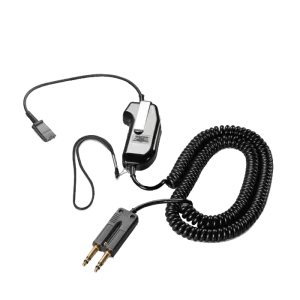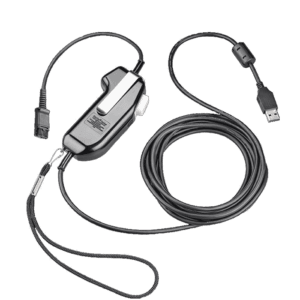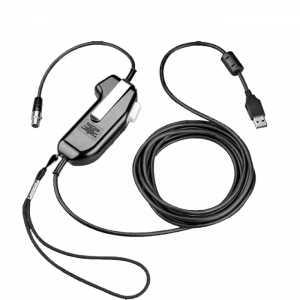911/Dispatch Headsets, Amps & Batteries
Showing 17–19 of 19 results
-
$155.08
 Poly SHS1890-25 PTT AmplifierRated 4.67 out of 5Add to cart
Poly SHS1890-25 PTT AmplifierRated 4.67 out of 5Add to cart -
$165.60
 Poly SHS2355-11 PTT USB AdapterAdd to cart
Poly SHS2355-11 PTT USB AdapterAdd to cart
-
$194.64
 Poly SHS2371-11 PTT USB AdapterAdd to cart
Poly SHS2371-11 PTT USB AdapterAdd to cart
In-the-Ear Headsets
As you research dispatcher headsets, you’ll find that in-the-ear options have been popular for decades, giving operators an ear tip that seals off sound within their environment. Being low profile and lightweight, in-the-ear models work well when you also need to communicate with people around you.
Headband Model Dispatch Headsets
For dispatch operators more comfortable with headband models, single ear headsets give you a configuration allowing you to hear your caller while being able to talk with co-workers. For those applications that require the wearer to focus completely on their call and not be distracted by background noise, a binaural headset makes an excellent choice.
Operator headsets with an over-the-head headband, on-ear wearing style will come in good, better, and best levels. The good version will be your entry level based on a budget friendly price point. These typically have replaceable foam cushions, and minimal extra cushion.
Your mid-range operator headsets will be the most common tier found in most 911 PPT dispatch centers. Built to last, this tier will sound great and last for years giving you peace of mind and excellent value for your operator headset investment. Replaceable foam cushions, an adjustable headband and flexible noise canceling microphone will allow you to be comfortable with excellent audio quality for the longest of shifts and 24/7 911 emergency dispatch operations.
The top tier emergency dispatch headsets will come with leatherette cushions and improved audio performance making communication easy and effortless. If your budget can afford it, the improvement and upgrades are well worth the added expense and will benefit your headset operators for years to come.
Having Spare Dispatch Headsets is Highly Recommended
If you manage a 911 emergency center and use dispatch operator headsets, you will need to make sure to have spare units and genuine replacement accessories on hand as staffing changes and equipment occasionally fails. 911 center equipment is very unique and 911 Push to Talk products are not stocked at your local electronics store of office supply super centers. Having spares will keep your center up and going 24/7 and reduce operator stress knowing they can quickly swap out equipment at a moment's notice.
How First Responder Headsets Connect & Work
When considering wired or wireless emergency 911 headsets you will need two pieces for a complete system. The top half is the operator headset. The bottom half is the Push-to-Talk (PTT) amplifier that connects to your console. Compatible Poly PTT operator headsets will have a unique connection at the end of the cable called a quick disconnect. The quick disconnect is designed and tested to withstand 30,000+ reconnects without failure. The same wired operator headsets are used for wired and wireless solutions. The bottom PTT amplifier is where you have the choice of wired (more budget friendly and no maintenance) or wireless (freedom to roam and multitask; requires charging of batteries for regular use).
For decades the standard 911 dispatch console has used 6-wire, 2-prong amplifiers from Poly with any H-series headset. As technology has advanced, many newer 911 dispatch centers have moved to USB connections instead of 2-prong connections. Current 911 operator headsets and amplifiers still use 6-wire configurations to handle radio and telephone communication.
Many dispatch centers also incorporate Y training cables into their solution allowing new users to listen into calls or allow managers to monitor calls. With both operator headsets and PPT amplifiers all connecting with a quick disconnect, you can quickly and easily connect a Y-cord with matching quick disconnects into your calls.
